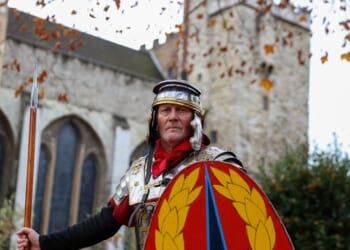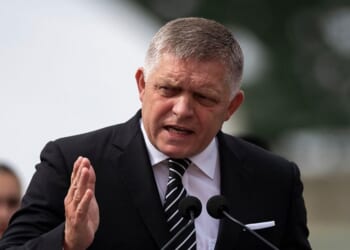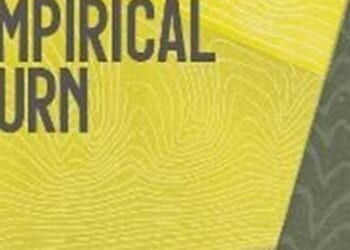Next Archbishop and past ones
From Canon Stephen Mitchell
Madam, — The Rt Revd Dr John Saxbee, in his bold and thoughtful article (Analysis, 19 September), is surely right when he writes that renewal, reinterpretation, development, and reformation are concepts firmly embedded in Christianity. If he sees some “defensiveness” in the Progressive Christian Network and others, it is hardly surprising, given the way in which some clergy have been treated by their bishops.
“Do you believe in God?” my then diocesan bishop asked in preparing to make a statement to the press. “It depends what you mean by God,” I replied. “It doesn’t matter what you mean. Can you say it? Do you believe in life after death?” “Christian belief begins with resurrection,” I said. “Yes, but the old people like it,” came the reply. Others have suffered far more difficult encounters.
The Revd Professor Paul Avis (Primate’s Portfolio, same issue) reminds us that all bishops have a canonical duty to teach the faith and with moral authority. But first they should be honest: honest to admit that, unlike the compilers of the 1662 Book of Common Prayer, they would not ask God to intervene to end a war, prevent the spread of a pandemic, or cause rain to fall on drought-stricken lands. Such honesty would admit that for some of them (in Dr Saxbee’s phrase) theological “-isms” have indeed become “wasms”. May our new Archbishop have such honesty.
STEPHEN MITCHELL
Chair of Trustees, Sea of Faith Network
93 Bantocks Road
Great Waldingfield
Sudbury CO10 0XT
From Dr Christopher Shell
Madam, — Andrew Brown’s excellent article “Prelate for a dry season” (Primate’s Portfolio, 19 September) contained an error. Far from being “an appeal to the ghosts in the pews, scarcely audible to the living”, Archbishop Coggan’s 1975 Call to the Nation attracted 27,000 letters “within days”, together with much positive media response.
The gentlemanly Dr Coggan laid the frustrating of his and so many others’ hopes for this initiative squarely at the door of active episcopal opposition. In his Lambeth Conference speech of 23 July 1978, he said: “Some of you have given up believing that God still speaks to the Church . . . but many in the congregations know that God does speak.” See his contemporary collaborator the Revd Dr Clifford Hill’s The Reshaping of Britain (Wilberforce, 2018).
Subsequent ecclesial and national history might have been very different had an alternative path been taken in 1975.
CHRISTOPHER SHELL
7 Markway
Sunbury TW16 5NS
From the Revd Jim Canning
Madam, — I do not recognise the declining Church of England in Andrew Brown’s survey. After ten years in thriving country parishes, I moved to the inner city in 1980. During 32 exciting years, we became a multi-cultural church with the highest Easter communicant numbers in the diocese. Since retirement, I have ministered in several lively country parishes.
As secretary of the Lambeth Diploma Association, I interacted with Archbishops Ramsey, Coggan, Runcie, Carey, Williams, and Welby. They all exercised their inimitable gifts and gave much to the Church of England.
JIM CANNING
Address supplied
Eric Milner-White and a Donne showstopper
From the Revd Paul Hutchinson
Madam, — The Revd Lucy Winkett is rightly lyrical in her praise for the Donne “prayer” that many of us know both as spoken text and in William Harris’s 1959 anthem (Prayer for the Week, 19 September). But, in being so, she makes the too-common mistake of attributing the whole prayer to Donne.
In Donne’s sermon, the text is not a prayer: and neither the beginning nor the ending of the prayer is Donne’s. Rather, his words became a prayer under the editing hand of Eric Milner-White: appearing first in Memorials upon Several Occasions in 1933 (later reprinted as After the Third Collect); and then in the OUP Daily Prayer in 1941 (later re-published by Pelican).
Milner-White acknowledges how many of the prayers he has edited come from the classic texts of Anglicanism; but the text that we know is a prayer because Eric made it so. The direct “Bring us, O Lord” are Milner-White’s words, not Donne’s; he abbreviates Donne in the middle; and the ending “in the habitations of thy glory and dominion, world without end” is also his. Donne’s shaping of contrasting ideas is superb, but let’s not forget Milner-White.
PAUL HUTCHINSON
The Rectory, St Neots
Cambridgeshire PE19 2BU
System for asylum-seekers and the ‘unity’ march
From Mr Giles Elliott
Madam, — I respectfully offer reasons for opposing Andrew Mitchell’s suggestion that people seeking asylum be supported via a loan system, to be paid back from future earnings (Letters, 5 September).
First, my — admittedly back-of-the-envelope — calculations suggest that supporting asylum-seekers amounts to roughly 0.05 per cent of the Government’s budget. This proposal would, therefore, have a minimal impact on our country’s economy.
Second, the people paying back the money would be those found to be genuine refugees. Those whose claims were rejected would not be paying the loan back, as they would either be deported, working in the underground economy, or destitute. This does not seem logical or fair.
Third, it is vital to understand that when someone is granted asylum, this is a recognition that he or she was a genuine refugee from the moment they arrived in the UK: the gap in time between the two events is the time that the State takes to make that determination. It is not a refugee’s fault that they have to rely on asylum support and accommodation for an extended period. In fact, until about halfway through the first decade of the 21st century, once a person was found to have refugee status, they were paid arrears of income support back to the original claim date, less any asylum support paid, to make up for this: a provision that also helped them to establish themselves in the UK.
Last, I truly hope that Mr Mitchell’s reference to “opulent accommodation” is stylistic hyperbole. As Refugee Action puts it, “these buildings are technically hotels, or at least used to be. But everything that makes a hotel a comfortable or desirable place to be has been removed. What’s left are small rooms with no facilities that are completely unsuitable for families, children and, to be honest, most individuals.”
Lest we forget, the people we are talking about here have fled war, violence, conflict, or persecution: clearly the outcasts and the strangers we are taught to have a special care for.
GILES ELLIOTT
4 Henderson Street
Manchester M19 2GT
From Dr Imogen Wedd
Madam, — I am increasingly concerned about pejorative language in Christian discourse. Surely this is not the way to wisdom, understanding, and peace. I seem to recall one who had a short way with those who condemn others without examining themselves.
Underlying the dismissive labels is an implicit assumption of rightness and righteousness which I am not at all sure is warranted. Who made us the judges? Are we so very sure we are the good people? I am not at all convinced that Charlie Kirk, Tommy Robinson, or “unity” marchers are significantly lesser people than I am, or that their “far-Right” views are significantly worse or more damaging than my “liberal” ones.
Some of what we believe today will not survive exposure to future life. I can vouch for this; I now have questions about very long-held assumptions. We need to be very honest about our own prejudices, stringent in examining the evidence that we rely on, and sceptical about the true nature of the tribes to which we give allegiance.
We would be very wise, I think, to remember Jacob Bronowski’s warning about the terrible consequences of “monstrous certainty”. The risks are compounded because the more certain we are, the more likely we are to make mistakes, and because certainty is bound up with fear, and it is through fear that true evil works its way; history is very clear on that. The antidote is humility, being ready to listen, and being sparing with scary names for those whose views are not ours.
IMOGEN WEDD
Address supplied
Recognition of Palestine and deaths in Gaza
From Mr Nigel Edward-Few
Madam, — I’m looking forward to the other 100 or so Bishops, including the Archbishop of York, explaining why they haven’t signed the letter welcoming the recognition of Palestine.
NIGEL EDWARD-FEW
5 Rose Drive
Chesham HP5 1RN
Leadership by older people can be an advantage
From the Revd Richard Adams
Madam, — Canon Angela Tilby (Comment, 12 September) points out some of the disadvantages when power is in the hands of older people, and the need for leadership to incorporate the perspectives of younger people. What might be more important than chronological age, however, is what might be termed “psychological age”.
Richard Rohr talks about the “second half of life” as being a stage after the ego has fully formed, and in which the person can step away from their own psychological needs and priorities to focus on others and on wider society. This is a necessary condition for political leaders to be really effective in considering the needs of their society, since using political power as a way of establishing one’s own ego can be disastrous (we saw a good deal of that during the last Conservative government).
Of course, there is no guarantee that age brings that kind of maturity, but it is also true that, the younger the person, the more likely it is that their ego is still in development and that, therefore, personal psychological needs will play too great a part in their leadership. Having said all that, I have no idea how voters can be guided to evaluate psychological maturity.
RICHARD ADAMS
Tros y Mor, Llangoed
Beaumaris
Anglesey LL58 8SB
Recognition of Palestine and deaths in Gaza
From the Revd Jonathan Frais
Madam, — “United Nations Watch is deeply concerned by Palestinian (PA) and Hamas recruitment and use of child soldiers in violation of international law” (19 March 2021). Unless the policy has changed, your tragic figure of 18,430 child deaths in the Gaza Strip since October 2023 (News, 19 September) includes teenagers firing guns. (They don’t count as soldiers on Hamas statistics because their fighters wear no uniform; so all casualties are civilian.) What a difficult war!
JONATHAN FRAIS
11 Coverdale Avenue
Bexhill-on-Sea TN39 4TY
What do the young think priesthood is?
From the Revd Roger Knight
Madam, — Reading about the shortage of vocations (“House in need of a structural survey”, Primate’s Portfolio, 19 September) took me back fifty years to when I was considering whether God was calling me to ordained ministry. The work, as I envisaged it, was leading worship (especially holy communion), preaching the gospel, teaching the faith, offering pastoral care, and being a usefully significant member of the local community. This role I did my best to fulfil until I had to retire on my 70th birthday.
I wonder what picture a young person considering ordination today would have of what it means to be a priest in the C of E?
ROGER KNIGHT
5 May Street, Cuxton
Rochester, Kent ME2 1LR
Applied intelligence
From the Ven. Paddy Benson
Madam, — The other day, I led a Bible study; we read Genesis 12. When we reached verse 8, one of the participants was interested to see that Abram visited an ancient Canaanite data centre: “He pitched his tent between Bethel on the west and Ai on the east.” Just thought you would like to know.
PADDY BENSON
26 West Park Drive
Leeds LS16 5BL
The Editor reserves the right to edit letters
















